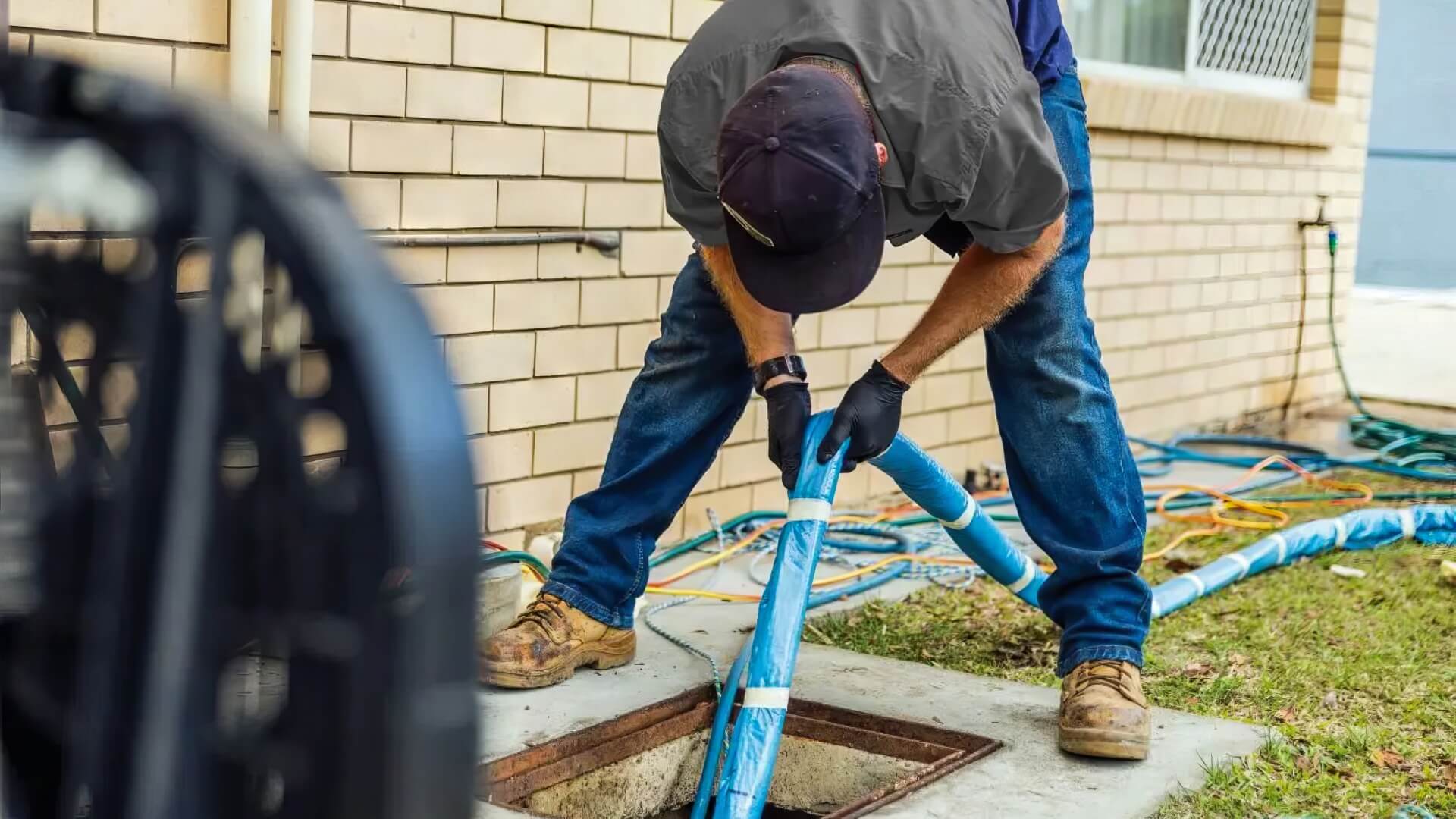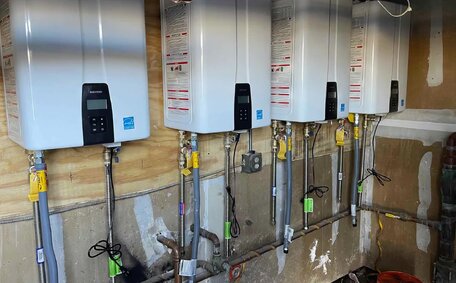Introducing Efficient Hot Water Systems
Choosing an energy-efficient hot water system is essential for any home. Current electric hot water systems are highly efficient, integrating advanced technology to conserve energy and reduce running costs.
The two main types of water heater options available today are electric and gas, including tankless models. Within these broad categories, there are different water heater systems configurations and energy sources to evaluate. Key factors to assess in different heater systems include:
- Upfront system costs
- Installation requirements
- Energy efficiency ratings
- Energy source (electricity, natural gas, gas LPG, solar)
- Water heating capacity
- Operating costs
No single system fits all, as the ideal choice, from tankless water heaters to other types, hinges on your household’s specific needs and usage habits. By understanding efficiency ratings and conducting thorough research, you can select a hot water heat pump system that delivers water only as needed, harmonising with your budget and locality.
This article explores the advantages and disadvantages of popular gas and electric hot water heaters, helping you make an informed choice. We aim to empower you to make the most informed decision when investing in this integral home system.
Comparing Upfront Costs
Gas water heaters typically incur lower initial purchase and installation costs compared to electric systems. They may be around $800-$1,000 for the unit, plus an additional $300-$600 for professional installation.
In contrast, investing in a gas system such as a solar hot water system or water heat pump system typically ranges from $2,000-$4,000 installed. The higher initial outlay is due to the more complex technology involved with electric water heater heat pumps. However, with government rebates and incentives reaching up to $1000, the costs can be notably mitigated when it comes to the initial outlay for a type water heat pump system.
Though gas hot water systems are more budget-friendly at the outset, a higher purchase price does not necessarily mean increased long-term running costs. Heat pumps can operate as an energy saver, which can save money considerably in the long run, in contrast to the less expensive upfront gas models. We weigh up lifetime costs later in this article.
Installation Requirements
Gas electric hot water systems usually present simpler installation requirements than electric heat pump systems.
For gas heaters, the main consideration is having an existing natural gas line to which the heaters require a connection. A skilled gas fitter can manage the installation which entails safely connecting the gas line, fitting pipes, and on the other hand, ensuring stringent gas safety compliance.
Conversely, gas electric hot water systems may require upgrades to meet their higher energy requirements. There are also refrigerant lines to connect for the heat pump operation. Using a specialised installer who understands the specifics of a system that heats water is recommended to ensure correct electrical capacities and connections.
This may involve installing a new circuit breaker in the switchboard, running thicker cables, and having adequate space for the larger gas hot water heater unit.
For either gas electric water heaters, other factors include having proper drainage, water lines able to handle continuous flow rates, and space for the hot water unit or heat exchanger. Indoor, outdoor, and rooftop installations are possible depending on access.
When choosing a system in Colyton NSW, requirements are impacted by local Sydney Water connections, council regulations, and energy infrastructure available in the area. Our Colyton-based team expertly tailors the best hot water solutions to deliver what you need, managing all aspects of the installation to consistently supply hot water in compliance with relevant regulations.
Analyzing Long-Term Operating Costs
Electric heat pump systems are often substantially more efficient over the long term compared to advanced gas storage water heaters.
According to 2021 data, electric gas heat pump units can be significantly more energy efficient than the most common traditional gas storage units, with some ratings displaying over threefold superiority. For example, a high-end heat pump might rate 5 stars with over 3.5 units of energy production per unit consumed. In comparison, the best gas systems maintain productivity, offering hot water even during power outages, yet typically rate around 4 stars and under 1 unit of energy production.
This efficiency gap between gas and electric water heaters directly impacts your monthly utility costs. For a household with moderate water use, an efficient electric heat pump hot water heater could cost as little as approximately $200 annually to operate. An equivalently sized system using gas can cost $400+ annually in gas bills to heat the same volume of water.
Hot water heat pumps boast a more long-term lifecycle, often exceeding 20+ years due to their fewer moving parts making heaters more durable and reliable. As electricity grids worldwide shift towards renewable energy, the operating costs and environmental impacts from electric systems will fall further still.
While heat pumps have higher upfront costs, their efficiency and longevity deliver great value over decades of operation. For most homes, the long term savings on their heater your household enjoys far outweigh the initial investment.
Environmental Impact Considerations
When examining environmental impact, modern electric heat pump water heaters tend to perform better than gas systems in the long run.
Electric hot water systems can operate with minimal greenhouse gas emissions by leveraging renewable energy sources. As grids worldwide shift towards incorporating more solar panels, wind, and hydro generation, the climate benefit increases.
Even on today’s grid, an efficient electric heat pump emits around half the CO2 compared to the most advanced gas water heater per litre of hot water supplied over 15 years of operation.
In contrast, gas systems, be it those using natural gas or LPG, directly combust fossil fuels - a resource being phased out for environmental concerns. Most operate using mains natural gas, while some rely on bottled LPG. Both contribute substantially to residential carbon outputs unless offsets are purchased.
Modern electric heat pump water heaters offer an eco-conscious choice for homeowners aiming to lower their carbon footprint. The ecological advantages of heat pump water heaters will enhance as the generation of sustainable electricity grows.
Maintenance Needs for Gas vs Electric
When it comes to maintenance, gas hot water systems generally need more frequent checks than pump hot water appliances.
It’s recommended that gas systems receive annual maintenance checks by a licenced technician. This involves inspecting the gas lines, burners, venting and pipework for leaks or blockages.
The system with water stored may also need flushing to prevent sediment buildup. Replacing worn parts can help prevent issues emerging mid-winter.
In comparison, there no heavy maintenance schedule with electric heat pump water heaters, which have very minimal requirements. Their closed unit doesn’t require venting or pipework checks. The minimal moving parts in heat pumps decrease the likelihood of malfunctions, making them a steadfast option without dependence on gas or electricity supply stability.
Simple upkeep, such as cleaning the air filter, is often sufficient between major services, which are generally only needed every five years or more.
Ultimately gas systems involve more potential safety hazards given their use of fossil fuels. Proactive maintenance is crucial to prevent leaks or combustion risks arising over time through worn parts. Electric heat pumps provide reliably safe and low maintenance operation for many years.
Enhancing Efficiency With Heat Pump Technology
With several types of hot water systems available, pump hot water systems technology offers significant strides in efficiency for homeowners. Heat pumps leverage principles of heat exchange and compression to extract heat from the surrounding air and transfer it to water.
Heat pumps can produce 2-3 times more energy than they consume, offering much higher efficiencies than conventional electric hot water systems. The only byproduct is harmless condensate water rather than greenhouse gas emissions produced by gas systems.
Modern heat pump hot water systems, renowned for churning out hot water efficiently, can supply all your hot water needs at a fraction of the energy consumption of gas or standard electric systems. With advanced temperature controls, these pump hot water systems only utilise as much energy as required to heat water efficiently.
Homeowners considering an upgrade will find heat pump water heaters to be a highly efficient option. They can cut hot water bills by over 60% compared to gas while avoiding its fossil fuel dependence. As electricity grids shift towards renewables, these savings and environmental benefits will only increase over time.
Our Colyton-based experts specialise in heat pumps, offering customized systems and managing everything from provision to installation. We ensure heat pumps are correctly sized for your household’s usage needs. Heat pump systems stand out for their exceptional reliability and energy efficiency, bolstered by minimal maintenance needs and lasting performance.
Rebates and Incentives Available
Substantial rebates and incentives are often accessible for the installation of energy-efficient water systems in your home.
Rebates up to $1000 are available from the Australian Government for installing qualified heat pump or solar hot water systems. Eligibility criteria includes factors like the energy rating and household eligibility. Check the latest requirements when applying.
Additionally, NSW offers periodic rebates for replacing old electric storage units with new electric heat pump or gas water systems. Up to $500 can be saved here, particularly when investing in solar water heating solutions, with additional discounts sometimes offered for concession card holders.
Your local council may also provide rebates, often worth up to $500, for installing eligible low emission hot water systems.
On top of government incentives, many hot water retailers and installers offer additional discounts on both the system purchase price and installation costs. Talk to suppliers such as our Colyton-based team about optimising value when upgrading your hot water system.
Knowledge of your hot water needs and system research could result in significant rebates and cost reductions. This can offset a significant portion of your initial investment, allowing upgraded systems like heat pumps to pay back faster through their far greater efficiency.
Choosing the Right System for Your Home
When selecting a new hot water system, carefully consider your household’s unique needs and preferences. Key aspects to weigh up include:
- Number of occupants and bathrooms to understand expected daily hot water demand
- Electricity and gas supply availability on your property
- Upfront purchase and installation costs within your budget
- Ongoing energy costs and efficiency ratings that impact operating expenses
- Available rebates, incentives and discounts to offset initial outlays
- Environmental priorities regarding renewable energy usage and emissions
- Local climate conditions that affect equipment performance
Striking the optimal balance between these types water heating options will lead you to the right hot water system for your home. Our expertise guides us in selecting and tailoring the best hot water system to meet your household’s specific requirements.
We recommend consulting hot water specialists like our Colyton team. We assist in securing your long-term comfort, economic savings, and sustainability.
Concluding Thoughts
When selecting a new or upgrading a hot water system, consider the environmental implications and the total cost of ownership. The energy efficiency and sustainability of modern gas and electric water heaters gain importance as electricity grids evolve to include more renewable energy. Despite the higher initial cost, the environmental advantages, low maintenance, and extended lifespan of electric systems present a valuable long-term investment over gas alternatives.
Our experts make sustainable hot water system upgrades straightforward for homeowners in Colyton. We handle everything from quotes to installation, optimising value through available rebates. With experience across all system types, we can advise the perfect hot water solution to meet your water usage and household requirements. Secure your home’s sustainability by reducing carbon emissions and energy expenses.
To explore your options obligation-free, email or call our Colyton team today. We offer free consultations to evaluate your current system and its usage. Together, we can determine the most cost and carbon efficient hot water system to meet your household’s needs.






